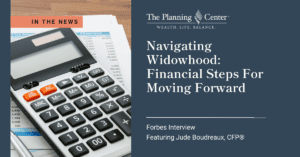
By Caleb Arringdale,Tax Advisor
While sharing the wealth during your lifetime can be a great thing for you and your children, sometimes it’s best not to gift. To help illustrate the point, here is a scenario that you want to avoid:
Let’s say Grandpa was a visionary who bought stock in Apple, Microsoft, and Amazon when they went public. He held on to the stock and now that it’s worth a fortune, he wants to share it with his children and grandchildren. Instead of giving the stock as gifts during his lifetime, he should make them part of his inheritance. Here’s why.
Difference Between Capital Gains on Assets that are Gifted vs. Inherited
For tax purposes, the cost basis for an asset is its original value or purchase price. The capital gain of the sale is determined by the asset’s cost basis at the time it was sold. When stock is gifted, and the recipient sells it, the tax basis is the difference between the original purchase price and its selling price. In this case, we’d take the price Grandpa originally paid for the stock and subtract the amount the recipient sold the stock for. Since these stocks have seen huge gains, the recipient will have a big tax bill, which significantly diminishes the gift.
If the recipient inherits the stock from Grandpa, the tax code allows for a step-up in basis, raising the cost basis to whatever the stock price was on the day Grandpa died. In practical terms, this zeroes out any capital gains on the stock and taxes due are minimal.
Generally speaking, if your estate doesn’t exceed $12M for an individual or $24M for a couple, there are few obstacles to passing your wealth tax-free to the next generation. That’s true whether they receive it as a gift during your lifetime or they inherit it. If your net worth exceeds those amounts, there are still plenty of options for minimizing estate taxes.
If you have questions or would like to discuss the tax implications for wealth transfer, contact The Planning Center today. Our dedicated tax and financial planners can help you set up tax mitigating options for gifting your family.
 Caleb Arringdale is a Tax Advisor in the Quad Cities office of The Planning Center, a fee-only financial planning and wealth management firm.
Caleb Arringdale is a Tax Advisor in the Quad Cities office of The Planning Center, a fee-only financial planning and wealth management firm.
Please email Caleb at: caleb@theplanningcenter.com.





